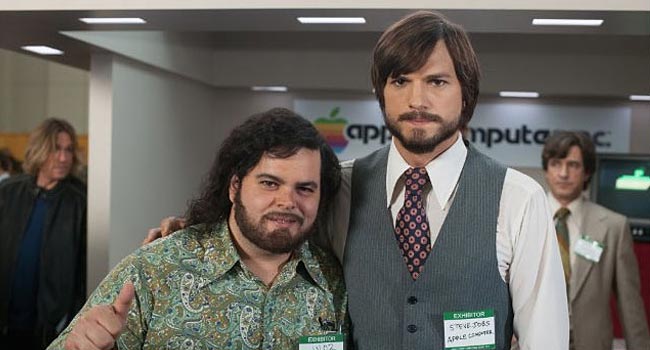
Jobs is about as straightforward and unremarkable a hero's story as you can imagine.

Jobs is about as straightforward and unremarkable a hero's story as you can imagine.
The first of what will surely be an unending wave of Steve Jobs films (Aaron Sorkin is hard at work on his) is here, and a doozy it’s not; Joshua Michael Stern’s Jobs is about as straightforward and unremarkable a hero’s story as you can imagine, never mind the elephant in the room that is Ashton Kutcher‘s strained and uneven take riff the Apple genius. Despite all its shortcomings, a few elements work: the focus on Jobs pre-iPod/iMac, the strong supporting cast, the willingness of the filmmakers to show Jobs at his darkest and most unlikable. What it comes down to is that the negatives severely outweigh the positives, a disparity that the real Jobs would have likely thrown a spitting, fuming tantrum over.
The film opens in 2001, with Jobs’ reveal of the iPod (Kutcher’s resemblance to the man is actually pretty startling.) Then, we zip back to 1971, where he’s a stinky, bare-footed, horny hippy at Reed College. He takes embarks on an LSD trip and we’re treated to one of the most idiotic-looking montages I’ve seen—Kutcher is flailing his hands like a fool in an attempt to pantomime an orchestra conductor while (you guessed it) orchestra music plays and the camera twirls around his dunce ballet. This is meant to show that he’s a genius, that mind works complexly, somewhat musically, and on a plane we can’t understand. Instead, it comes off as silly and heavy-handed. I get that Kutcher’s dumb expression is appropriate—he’s tripping balls after all—but the sequence just feels confused.
After an enlightening journey to India and some fiddling around as a technician at Atari, we see Jobs and his buddy “Woz” (Steve Wozniak, played endearingly by Josh Gad) found Apple computers (they work out of Jobs’ parents’ house). Now we dive into the meat and potatoes. Fueled by Jobs’ drive and ingenuity, company grows and grows, until it’s so big that its board of directors—who don’t appreciate the high financial risks of Jobs’ lofty vision—fires Jobs, booting him from the company he birthed in his parents’ garage. Years later, as Apple flirts with irrelevancy in the ’90s, they invite Jobs back, and he returns triumphantly (we glimpse conceptualizations of the first iMac, you know, the awesome candy-colored ones.)

The story Stern and writer Michael Whitely are trying to tell is actually a good one. The period of Jobs’ life they focus on is rife with all the trappings of a great drama. What they fumble with is getting the bits of story to cohere to a central arc. Some scenes, like one in which Jobs screams and breathes fire into a phone with Bill Gates on the other end, lead nowhere. In fact, it feels like a lot of the characters are thrown in simply to make those familiar with the Jobs story go “Ah! I know who that is!” It contributes almost zero to the narrative. “Steve, I’d like you to meet [insert name of guy from his biography].”
Kutcher puts forth a good effort. He really does. It’s clear that he’s spent days and days perfecting Jobs’ slouched saunter, his Midwest/Californian accent, and his infamously volcanic temper. Plus, he unquestionably looks the part. But, there are two problems here, the first and most important of which is that he simply doesn’t have the acting chops to carry the film. You can see it in his eyes; he’s constantly, desperately grasping at the emotion he’s trying to communicate, and when (if) he finally finds it, he gets overly excited and plays it way too big and loud. Everything he does feels magnified (his accent feels painfully forced), but that’s not the most distracting thing.
With some actors (Will Smith, Angelina Jolie), I have difficulty divorcing their character from their celebrity. Ashton Kutcher is the prime example of this barrier to belief. When I see him, I see the guy from “Punk’d” who wears funny hats and tweets on the daily. I just can’t shake it. Unlike a lot of actors, he’s made himself widely accessible to the public, which makes it nigh impossible for me to dissociate his face from his fame. I believe it’s the actor’s job to convince us of their role, to deceive our perceptions of who we think they are in reality. By this standard, Kutcher may have dug himself into a hole too deep to escape.
Kutcher does show glimpses of fine acting—some (not all) scenes where he seethes and bursts with rage are truly intense, and a pivotal bedroom breakdown (captured nicely by Stern) resonates emotionally. Whiteley’s dialogue is blunt and heavy-handed, but the supporting players have no problem making their lines count (legendary character actor J.K. Simmons plays a great jerk as a member of the board of directors.) The film isn’t the complete stinker I feared it would be; I love that it cuts off just before Jobs’ glory days (we only get a brief look at the “keynote master” Steve Jobs we’re all so familiar with), and Stern illustrates vividly his fight to conquer the mountainous challenges he was faced with. Unfortunately, the film’s major moving parts are damaged, effectively crashing the machine. Send this one back to the factory.
Jobs opens this Friday, August 16th.